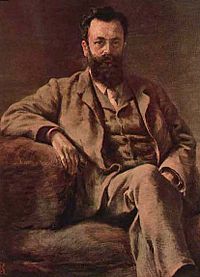Henry Gustav Simon
Henry Simon (1835–1899) was a German born engineer who revolutionised Great Britain's flour milling industry and in 1878 founded the engineering companies Henry Simon Ltd and Simon Carves. His second son, Ernest Simon went on to become the first baron of Wythenshawe.
Henry Simon was born in Brieg, Silesia, then a province of Prussia, on 7 June 1835. His father was a director at one of Germany's first railways, which allowed Henry to spend much of his youth in and among the railways; sparking an inclination to study mechanics from an early age. In his teenage years, Henry was witness to the revolutionary ferment of 1848 and gradually grew disillusioned with his native country. When his much loved uncle Heinrich Simon was forced to seek political refuge in Switzerland, Henry followed him and it was here that he went on to gain his Engineering Diploma from Zurich Technical Polytechnical School. Armed solely with this and a 'surcharge of mental energy and business initiative', Henry moved to Manchester where he would make a lasting name for himself. In 1874 Simon married Mary Jane Lane of Melbourne, Australia who bore him a son, Ingo in 1875 before her death in 1876. Subsequently,in 1878, he married Emily Stoehr who added a further four sons and three daughters, their eldest son, Ernest Darwin, was to succeed him on his death as head of the business and become Baron Simon of Wythenshawe in 1947.
Despite arriving in Manchester in 1860 without a penny to his name, within seven years Henry had established himself as a consulting engineer with his own office and become a naturalised British Citizen. But it was in 1878 when he saw his first real success. By introducing a rolling flour milling plant for McDougall Brothers in Manchester, the likes of which he had seen working in Switzerland, Henry set in motion and guided the 'Rollermilling Revolution', a mechanisation of the British flour milling system. Not only did this form the foundation of his own successful business, Henry Simon, converted to a limited company in 1896/7, but it also transformed the 'slow, laborious and costly' batch pattern previously used, into one of the most 'highly mechanised industries in the world'.
In 1878 he turned his interest towards the transformation of a second industrial process; revolutionising the manufacturing of coke. A conservative and crude process, the use of 'beehive ovens' to produce a deposit of coke also caused the creation of by-products which proved harmful to the environment; posing another 'promising development' for Henry Simon to introduce a technological change.
...
Wikipedia

